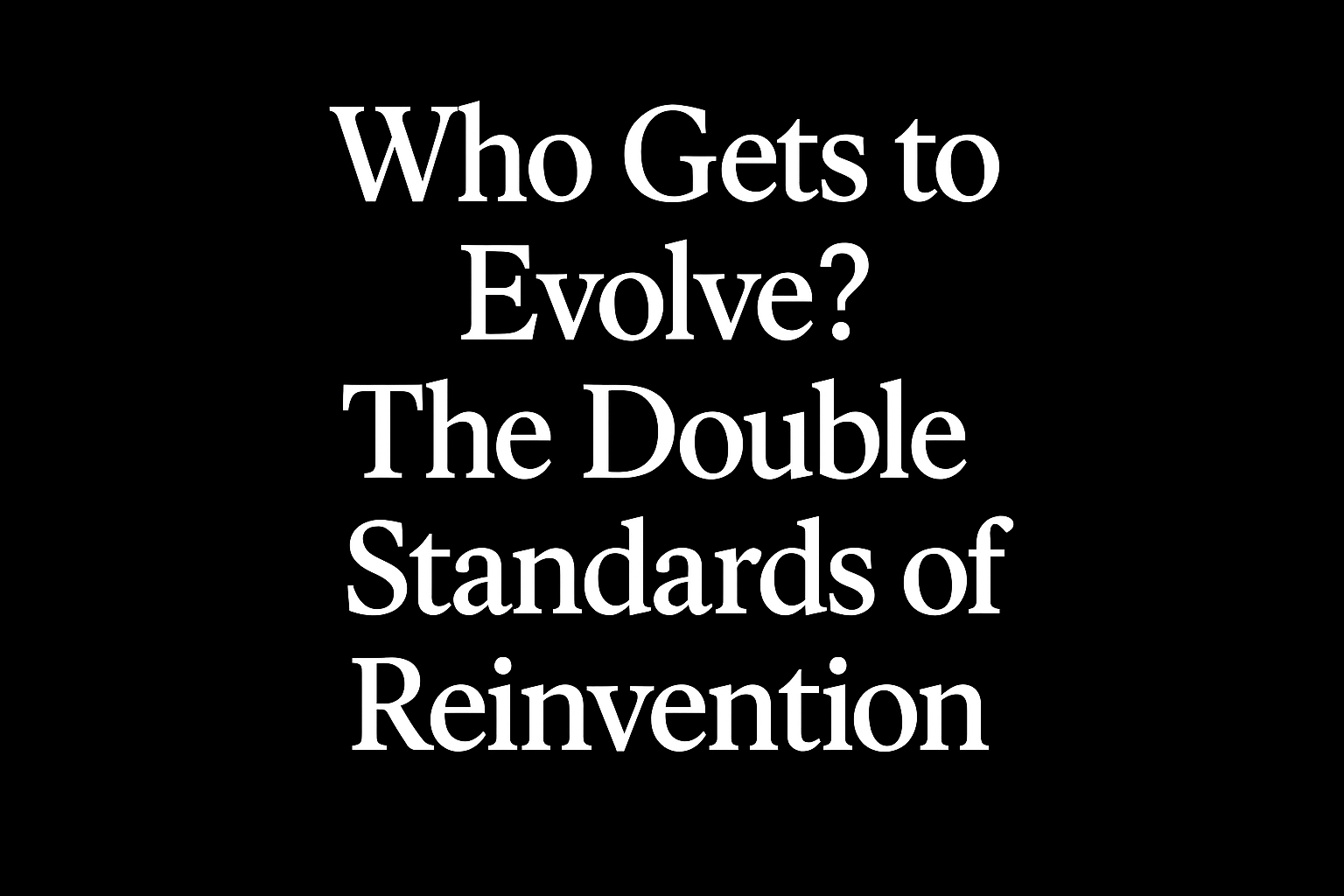Who Gets to Evolve? The Double Standards of Reinvention

Lately, I’ve been thinking about how whole careers can be lit by Black music and Black style, how those careers can be marketed on the back of a thing that wasn’t theirs to sell, and then how, once the checks clear, the story quietly changes. It’s not rage I want to stir up. It’s attention — precise, patient attention — toward a pattern I keep seeing: artists build themselves with Black culture at the fore, only to pivot away once pivoting is safer, more marketable, or more comfortable for them. Call it race as convenience.
Take Beyoncé. She’s from Texas. Country, like so much American music, runs through her lineage. Yet when she stepped onto the CMA stage in 2016 with The Chicks to perform “Daddy Lessons,” the reaction was immediate and loud. Clips were scrubbed, backlash poured in, and the moment exposed exactly what I mean by cultural gatekeeping — a show intended to celebrate a song became a referendum on who belongs in a genre. Watching that unfold felt historically cruel: a genre whose roots reach deep into Black music policing a Black woman for embracing the very sounds that made it possible. The memory of that moment is part of why Cowboy Carter lands as more than an album for me; it reads like a deliberate answer to being told she didn’t belong. Beyoncé herself said the project was “born out of an experience… where I did not feel welcomed.”
Contrast that with Post Malone. He popped off with “White Iverson” — braided, grill-wearing, drenched in hip-hop sonics — and then, over time, quietly loosened into pop, rock, and country-leaning sounds. In 2017 he made a comment that still gets quoted: “If you’re looking for lyrics, if you’re looking to cry, if you’re looking to think about life, don’t listen to hip-hop.” That line landed differently in public conversation than Beyoncé’s CMAs did: it read less like sacrilege and more like a self-aware, if clumsy, expression of musical taste. When Post shifted toward twangier melodies and soft rock textures, mainstream headlines called it versatility rather than betrayal. That asymmetry — who gets a shrug and who gets a crucible — matters.
Miley Cyrus is another study, but instructive. She exploded out of Disney by courting shock: twerking, hip-hop collaborations, the full messy, flirtatious Bangerz era. Then, a few years later, she publicly explained she’d “moved away” from that sound — saying bluntly that certain lyrical and cultural turns pushed her out of the scene. She later admitted she’d been careless, that she’d used hip-hop as a costume to shed her Disney skin. The arc is familiar: borrow the energy, borrow the edge, cash in on the novelty, then step away and call it evolution. The trouble is the leaving often comes with no reckoning, no repayment, and no acknowledgment of the community that powered the lift.
And then there’s Justin Timberlake — maybe the most emblematic of them all. For years, he made some of the most forward-thinking pop and R&B of the 2000s: Justified, FutureSex/LoveSounds — still undeniable, still built on the bones of Black innovation through Pharrell and Timbaland. But somewhere around 2018, he pivoted to Man of the Woods, rebranding himself in flannel shirts and “back to my Tennessee roots” language. The music didn’t even sound that different — it was still pop-funk dressed in woodgrain marketing — but the story had changed. Suddenly, the man who built his empire off the soul of Black producers and the rhythm of Black music wanted to sell “authenticity” in the form of Americana cosplay. It wasn’t malicious, just convenient. It was safer to be a “country man” in a climate that wanted rootsy nostalgia over R&B futurism. And as always, the rebrand went down easy because white comfort smooths everything over.
Why am I insisting this isn’t about calling names? Because I don’t think most of these people secretly hate us. They are, more often, opportunistic and lazy, or simply unreflective. That’s the sting. They admire the flavour and the momentum, but not always the history. They’ll repurpose the music, the fashion, the dance moves, etc., — so long as it helps them land — and then move on when the marketplace demands a different costume. The difference is that when a white artist borrows and shifts, public discourse often grants them the freedom to simply be “eclectic.” When a Black artist leans into country or folk, they are interrogated on ancestry and authenticity, asked to prove belonging that was never required of their white peers.
This double standard becomes painfully visible when you look at public reaction. Beyoncé’s country-inflected moves were policed and dissected. Post Malone’s detours were debated and then folded into a narrative of genre-fluidity. The questions we ask depend too often on the colour of the person asking them, not on what they actually do. If we care about consistency, we have to notice that.
Not everyone who borrows acts the same. There are artists who borrow and do the hard, humble work of acknowledgement and uplift. Adele is one of them. The most famous example came at the 2017 Grammys: winning her first Album of the Year, she immediately refused it, dedicating it to Beyoncé. “My artist of my life is Beyoncé,” Adele gushed, calling Lemonade “so monumental… so well thought out, and so beautiful and soul-baring.” She even noted the effect Beyoncé had: “the way that you make me and my black friends feel… is empowering. I love you, I always have and I always will.”
That moment mattered — not just because Adele said what so many were thinking, but because she understood what it meant to share the mic. She saw herself as part of a lineage, not above it. When she later got called out for wearing Bantu knots at Notting Hill Carnival, Black fans defended her because they recognised her heart, her humility, her history of standing up when it counted. The difference wasn’t perfection — it was posture. Adele moves with gratitude, not entitlement.
Hozier is another example I keep coming back to. He makes music drenched in blues and gospel feeling, and he’s explicit about it: the blues and Black music are not background colour for him; he names them as foundation. He’s also shown up when it mattered — lending his platform to Black Lives Matter and speaking openly about the political and spiritual lineage of the sounds he borrows from. That kind of acknowledgement — naming debts, naming lineage, stepping into solidarity — is what cultural exchange should look like.
This pattern stretches beyond Western borders. K-pop’s global ascent has been accompanied by recurring controversies about how Black culture is borrowed and presented — hip-hop aesthetics, dance styles, even hair and slang have been adopted in ways that sometimes read as tribute and sometimes as caricature. Recently, a number of K-pop acts have had to apologise for hip-hop-themed concepting or for styling choices that crossed a line; those apologies are telling because they show the world’s appetite for Black culture and the frequent absence of the humility that should come with consuming it. If Black culture is a global engine, the ethics of borrowing must become global too.
So, what do we do with this observation? I don’t want to invent moral purity where none exists, and I don’t want to make every crossover an indictment. Music is, and should be, porous. Genres cross-pollinate. Artists grow. But generosity does not require blindness. If you lean on a community for your sound, you owe that community visibility, context, and credit. At the very least, you owe honesty — to listeners and to yourself.
If rebranding means leaving a culture behind, say so. If you were lifted by a sound that was not your own, lift the people who made it, too. If you want to change lanes, don’t pretend the old pavement never existed. Because the next forty years don’t have to replay the same pattern. Black culture will keep being generous — that generosity is a constant in my life and in music — but it doesn’t owe anyone an unearned pass. We can be generous and exacting at once.
I want artists to be courageous enough to be complicated: to borrow, to praise, to pay, to defend, to name, and, when necessary, to be corrected. That’s the transaction I’m rooting for. If you asked me what real respect looks like in this moment, it’s this: acknowledge the lineage, refuse the erasure, and make room for the people who always had the music first.






